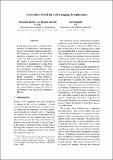A Statistical Model for Lost Language Decipherment
Author(s)
Snyder, Benjamin; Barzilay, Regina; Knight, Kevin
DownloadBarzilay_A statistical.pdf (371.3Kb)
OPEN_ACCESS_POLICY
Open Access Policy
Creative Commons Attribution-Noncommercial-Share Alike
Terms of use
Metadata
Show full item recordAbstract
In this paper we propose a method for the automatic decipherment of lost langauges. Given a non-parallel corpus in a known related language, our model produces both alphabetic mappings and translations of words into their corresponding cognates. We employ a non-parametric Bayesian framework to simultaneously capture both low-level character mappings and high-level morphemic correspondences. This formulation enables us to encode some of the linguistic intuitions that have guided human decipherers. When applied to the ancient Semitic language Ugaritic, the model correctly maps nearly all letters to their Hebrew counterparts, and deduces the correct Hebrew cognate for over half of the Ugaritic words which have cognates in Hebrew.
Description
URL to paper listed on conference site
Date issued
2010-07Department
Massachusetts Institute of Technology. Computer Science and Artificial Intelligence Laboratory; Massachusetts Institute of Technology. Department of Electrical Engineering and Computer ScienceJournal
Proceedings of the 48th Annual Meeting of the Association for Computational Linguistics, ACL 2010
Publisher
Association for Computational Linguistics
Citation
Snyder, Benjamin, Regina Barzilay and Kevin Knight. "A Statistical Model for Lost Language Decipherment." in ACL 2010, 48th Annual Meeting of the Association for Computational Linguistics, Uppsala, Sweden, July 11–16, 2010.
Version: Author's final manuscript